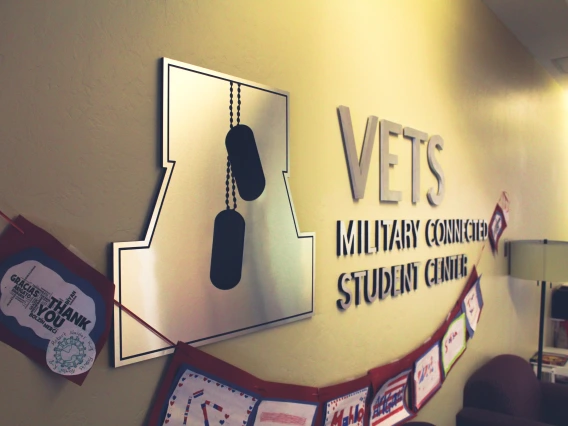
An NEH-funded project centered on the challenges of soldiers returning home after war will present a series of public discussions this week.
“Thunder of War – Winds of Return” is focused on narratives and giving veterans the opportunity to tell their own stories, said project director Barbara Citera, Associate Professor of German Studies. The project is funded by a $98,921 grant from the National Endowment for the Humanities, part of the Dialogues on the Experience of War program.
“Our project seeks to generate dialogues among veterans and their communities about the ever-unfolding journey home,” Citera said. “We’re giving military-connected students and other veterans the context for meaningful dialogues by leveraging the critical and compassionate lens so characteristic of the humanities to bring healing and wholeness.”
A collaboration between the College of Humanities and the VETS Center, the project began last fall with a course designed to train students to become discussion leaders, which included the study of sources from World War I, Vietnam and Afghanistan and Iraq.
That class was team-taught Bryan Carter, Associate Professor of Africana Studies, who covered WWI; Michael Marks, Professor of Practice at the VETS center, who covered Vietnam; and Nate Hogan, a veteran of the Iraq and Afghanistan wars and doctoral candidate at Pacifica Graduate Institute, who covered Iraq and Afghanistan.
“The students completed that discussion leader program, they examined a variety of material and sources and strategies for facilitating the conversations, and look forward to engage with fellow veterans and our community,” Citera said.
This week, those students will lead three discussions (registration required):
- Why Are You Fighting (WWI), Nov. 10, 4 p.m., UA Poetry Center
- I Served, So What’s Next? (Afghanistan and Iraq), Nov. 12, 10 a.m., Thunder Mountain Activity Center, Fort Huachuca
- Welcome Home! (Vietnam), Nov. 13, 10 a.m., Southern Arizona VA Health Care System
“The overall theme is coming home and how the soldiers adapted and were treated,” Citera said. “From there, the students started to look at different questions. In World War I, it was focusing on how Black American soldiers and Native American soldiers were treated. That is the core of the conversation for the event at the Poetry Center.
“The discussion about Iraq and Afghanistan will focus on the transition from the military into civilian life. The discussion about Vietnam will center on the homecoming and bridging the generational gap between the different generation of veterans.”
The last component of the project will be a documentary video, by Luis Carríon, a producer/videographer with the University of Arizona Digital Learning team who has been following the entire project.
“This is a project that’s not ending after the events,” Citera said. “It’s our hope to continue and build on the project on different levels, connecting our students and our community and provide opportunities for meaningful dialogues.”

